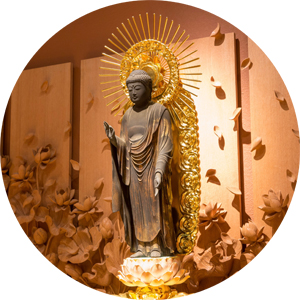
PHOTO:Hajime Honda
Ⅰ01.Buddhism in Japan
Statistics show that when asked “What is your religion?” 66 percent of Japanese people answered “Buddhism.” On the other hand, statistics show that when asked “Do you believe in any religion?” 71 percent of Japanese people answered “I don’t believe in any religion” to the question.
These two statistics may seem contradictory, but to Japanese people, neither statistic is wrong. Until now in Japan, the family system has been the foundation of society, so many people have come to think of Buddhism, which has been passed down as custom in their families, as their own religion.
Indeed, for many Japanese people, funerals and visiting graves are typically Buddhist-style. However, there are not so many people who take the initiative to study the teachings of Buddhism and put them into practice. It can be said that Japanese Buddhism has been passed down formally as a custom, without being deeply considered as one’s own faith.
Buddhism, originally preached by Gautama Buddha in India, was based on a philosophical system of logic. It was intended for individuals to transform themselves by their own volition. However, as it traveled across mainland China, various cultural elements mixed with the original Buddhism. Due to these various influences, the Buddhism that was introduced to Japan in ancient times had already changed significantly from the original Buddhism.
After its introduction to Japan, Buddhism continued to change as it mixed with indigenous beliefs and customs. Buddhism’s use as a social institution throughout different eras of history also had an effect. The Buddhism practiced in this island nation formed against this historical background.
I think that for Japanese people, their faith in Buddhism is something different from the devout faith seen in Islam, Judaism, etc. Japanese faith may not necessarily be based on clear individual beliefs or will.
However, it does not mean that Japanese people have no faith. Japanese people have a spirituality that has been passed down from generation to generation, even if they are not consciously aware of it. The Japanese have interpreted Buddhist doctrines in their own unique sense, formed their own unique Buddhist thought, and adopted it. I think it is a religious view that is diverse, flexible, and has an ecological spirituality.
Ⅰ_Japanese Spirituality
01. Buddhism in Japan
02. Thanks to all living beings for my life here and now.
03. Becoming One with the Buddha
04. Light from the other shore
Ⅱ_The teachings of Buddha and Mahayana thought
01. HANAMATSURI -The Beginnings of Buddhism-
02. Anyone can become a Buddha, it depends on you.
Ⅲ_Prince Shotoku’s Buddhist Dharma
01. Buddha in Japan
02. Ideal of sincerity, courtesy, and harmony
03. What’s false? What’s truth?
Ⅳ_The true state of mind conveyed by Shinran
01. The Three Treasures of Buddhism
02. SHIN is PRASADA
03. Neither a monk nor an layperson
Ⅴ_Listen to namamdhabud


